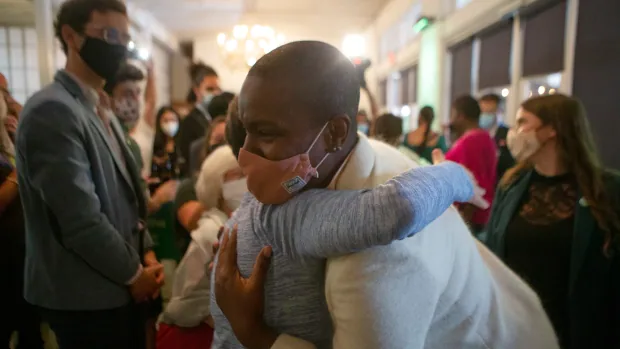Green Party Leader Annamie Paul has lost her bid to win Toronto Centre, and while her party’s national support has been greatly reduced compared to its 2019 results, it is still sending at least two MPs to Ottawa.
Trailing in fourth place, Paul congratulated Liberal incumbent Marci Ien on her re-election, which was called by CBC’s decision desk Monday.
It’s a disappointing result for Paul, who came in second in a byelection in 2020 and had banked on winning the riding as one key to maintaining her leadership of the Greens.
Speaking late Monday to supporters in Toronto, Paul said she was “disappointed” by the result but did not address her leadership of the Greens.
“It’s hard to lose,” she said, thanking her campaign workers, supporters and Greens across the country. She said she was heartened that there would continue to be strong Green representatives in Ottawa.
WATCH | Paul speaks on election night:
Green Party Leader Annamie Paul speaks after 2021 election results in her losing race for Toronto Centre riding. 1:12
Former leader Elizabeth May won her riding of Saanich–Gulf Islands, while Paul Manly remained, early Tuesday, locked in a tight three-way contest in Nanaimo–Ladysmith.
The party did earn a breakthrough win in Kitchener Centre, where CBC’s decision desk called the race for Mike Morrice. It’s the party’s first election win in Ontario and only the second outside British Columbia.
Paul spent most of the campaign in Toronto Centre. She left on just a handful of occasions, including to take part in the leaders’ debates, one jaunt to B.C., a trip to P.E.I. and another to Kitchener, Ont.
Running in Toronto Centre was a “very daring and risky choice,” May told CBC News just before that race was called.
Asked whether she would consider again taking on the party’s leadership should Paul eventually step aside, May was firm: “I’m the former leader, that’s what I’m staying.”
WATCH | May discusses the Green campaign and Paul:
Elizabeth May says Annamie Paul has deep connections to her riding, but Green Party leader loses it to Liberal 2:05
“The questions of Annamie’s future are really up to Annamie, and we’ll see how the rest of the evening goes,” she said.
May criticized the party’s failure to run a full slate of candidates in the election, calling it “shocking” and suggesting there should be a review of what led to that outcome.
The party experienced a rough start to the night, winning only single-digit support in parts of Atlantic Canada. In 2019 they received 17.2 per cent in New Brunswick, 11 per cent in Nova Scotia and fully one fifth of the vote in Prince Edward Island.
The party saw similarly harsh declines in Ontario and Quebec.
Party rattled coming into election
Going into the election, the Greens were locked in internal conflict over Paul’s leadership. The conflict, which burst into the public view after the departure of Fredericton MP Jenica Atwin to the Liberals, prompted a decline in popular support and contributed to significant financial challenges for the party.
Paul said recently she considered resigning as leader because of the crisis, and the conflict between her and the party’s federal executive bogged the Greens down for months.
They ran just 252 candidates across Canada’s 338 ridings. There were no candidates in Newfoundland and Labrador, just one on the eastern arm of Quebec and two in Edmonton.
The party released its platform costing just a day before the election, promising universal pharmacare and a reformed universal long-term care system. Other platform planks included a guaranteed livable income and student debt cancellation.
Paul spent much of the campaign arguing that only the Greens had the ambition to tackle the climate crisis. The party pitched an emissions reduction target of 60 per cent below 2005 levels by 2030.
May led the party to its best-ever result in 2019, when she was joined in Parliament by Manly and Atwin. But the party had hoped for more seats, and May resigned as leader shortly after the election. That prompted a closely divided leadership in which Paul eventually emerged victorious.




